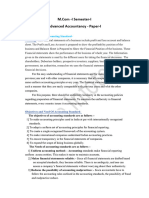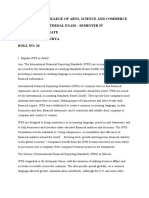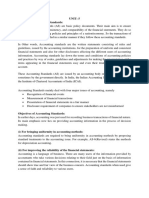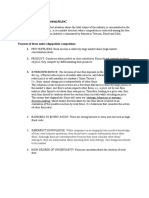IFRS Summary
IFRS Summary
Uploaded by
LimenihCopyright:
Available Formats
IFRS Summary
IFRS Summary
Uploaded by
LimenihOriginal Title
Copyright
Available Formats
Share this document
Did you find this document useful?
Is this content inappropriate?
Copyright:
Available Formats
IFRS Summary
IFRS Summary
Uploaded by
LimenihCopyright:
Available Formats
What is IFRS summary?
The IFRS Summaries provide an introduction to each standard in issue and a
quick reference source of key requirements. The Snapshots present a useful glance
of key provisions, with cross references to the summaries or standards as necessary.
This guidance is not a substitute for knowledge of the complete standards.
What are the 4 principles of IFRS?
IFRS requires that financial statements be prepared using four basic principles: clarity,
relevance, reliability, and comparability.
What is the meaning of IFRS?
International Financial Reporting Standards
International Financial Reporting Standards (IFRS) are a set of accounting rules for the financial
statements of public companies that are intended to make them consistent, transparent, and easily
comparable around the world.
What is the purpose of introducing IFRS?
IFRS specifies how businesses need to maintain and report their accounts.
Created to establish a common accounting language, the goal of the international
financial reporting standards is to make financial statements coherent and consistent
across different industries and countries.
What are the 4 principles of GAAP?
The four basic constraints associated with GAAP include objectivity, materiality,
consistency and prudence.
How can I learn IFRS?
Being me in your shoes, I would start my IFRS learning as a step-by-step
process:
1. Learn the basic structure of IFRS.
2. Read the Framework.
3. Get some knowledge about individual standards.
4. Develop your knowledge and be up to date.
What is difference between GAAP and IFRS?
The primary difference between the two systems is that GAAP is rules-based and
IFRS is principles-based. ... Consequently, the theoretical framework and principles of
the IFRS leave more room for interpretation and may often require lengthy disclosures
on financial statements.
How many types of IFRS are there?
The following is the list of IFRS, and IAS issued by the International Accounting
Standard Board (IASB) in 2019. In 2019, there are 16 IFRS and 29 IAS. IAS will replace
IFRS once it is finalized and issued by IASB.
What are the components of IFRS?
IFRS financial statements consist of:
• a statement of financial position (balance sheet)
• a statement of comprehensive income. ...
• a statement of changes in equity.
• a statement of cash flows.
• notes, including a summary of the significant accounting policies.
What are the main objectives of IFRS?
Its principal objectives are:
• to develop, in the public interest, a single set of high quality, understandable,
enforceable and globally accepted international financial reporting standards
(IFRS Standards) based upon clearly articulated principles. ...
• to promote the use and rigorous application of those standards.
What is the scope of IFRS?
Scope of IFRSs
IFRSs apply to the general-purpose financial statements and other financial
reporting by profit-oriented entities – those engaged in commercial, industrial,
financial, and similar activities, regardless of their legal form.
What is ind?
Indian Accounting Standard (abbreviated as Ind-AS) is the Accounting standard
adopted by companies in India and issued under the supervision of Accounting
Standards Board (ASB) which was constituted as a body in the year 1977. ... MCA must
spell out the accounting standards applicable for companies in India.
What is on balance sheet?
A balance sheet is a financial statement that reports a company's assets, liabilities,
and shareholder equity. The balance sheet is one of the three core financial
statements that are used to evaluate a business. It provides a snapshot of a company's
finances (what it owns and owes) as of the date of publication.
Is IFRS rules based?
One of the major differences lies in the conceptual approach: U.S. GAAP is rule-based,
whereas IFRS is principle-based. ... However, IFRS include positions and guidance
that can easily be considered as sets of rules instead of sets of principles.
What are the 5 basic principles of accounting?
5 principles of accounting are.
• Revenue Recognition Principle,
• Historical Cost Principle,
• Matching Principle,
• Full Disclosure Principle, and.
• Objectivity Principle.
What are the benefits of IFRS?
1. Advantages of IFRS compared to GAAP reporting standards
• 1.1 Focus on investors. ...
• 1.2 Loss recognition timeliness. ...
• 1.3 Comparability. ...
• 1.4 Standardization of accounting and financial reporting. ...
• 1.5 Improved consistency and transparency of financial reporting. ...
• 1.6 Better access to foreign capital markets and investments.
What is the difference between IAS and IFRS?
International Accounting Standard (IAS) and International Financial Reporting Standard
(IFRS) are the same. The difference between them is that IAS represents old
accounting standard, such as IAS 17 Leases. While, IFRS represents new
accounting standard, such as IFRS 16 Leases.
What are the various accounting principles?
Some of the most fundamental accounting principles include the following:
• Accrual principle.
• Conservatism principle.
• Consistency principle.
• Cost principle.
• Economic entity principle.
• Full disclosure principle.
• Going concern principle.
• Matching principle.
What Is GAAP?
GAAP is a set of rules used for helping publicly traded companies create their
financial statements. These rules form the groundwork on which more
comprehensive, complex, and legalistic accounting rules are based.
GAAP covers a wide array of topics such as financial statement presentation,
liabilities, assets, equities, revenue and expenses, business combinations,
foreign currency, derivatives and hedging and non-monetary transactions.
Financial accounting information is based on historical data. To facilitate
comparisons, the financial information must follow the generally accepted
accounting principles.
While the overall GAAP is specified by the Financial Accounting Standards
Board, the Governmental Accounting Standards Board (GASB) specifies
GAAP for state and local government. Compliance with GAAP as well as SEC
is required by publicly traded companies.
What Are the Principles of Accounting?
The best way to understand the GAAP requirements is to look at the ten
principles of accounting.
1. Economic Entity Principle
The business is considered a separate entity, so the activities of a business
must be kept separate from the financial activities of its business owners.
2. Monetary Unit Principle
The monetary unit assumption means that only transactions in U.S. dollar
amounts can be included in accounting records. It’s important to note that
accountants ignore the effects of inflation on the recorded dollar amounts.
3. Time Period Principle
The business activities may be reported in short, distinct time intervals which
may be weeks, months, quarters, a calendar year, or fiscal year. The time
interval must be identified in the headings of the financial statements such as
the income statement, statement of cash flow and stockholders’ equity
statement.
4. Cost Principle
The cost principle mentions the historical cost of an item. This refers to cash
or cash equivalent that was paid to purchase an item in the past. This asset
amount is adjusted for inflation. The historical cost is reported on the financial
statements.
5. Full Disclosure Principle
All information that is relative to the business and is important to a lender or
investor must be disclosed in the content of the financial statements or in the
notes to the statements. This is the reason that numerous footnotes are
attached to financial statements
6. Going Concern Principle
This accounting principle refers to the intent of a business to carry on its
operations and commitments into the foreseeable future and not to liquidate
the business.
7. Matching Principle
The matching principle requires that businesses use the accrual basis of
accounting and match business income to business expenses in a given time
period.
For example, the commissions for sales should be recorded in the same
accounting period that sales income was made (and not when they were
paid).
8. Revenue Recognition Principle
Under the accrual basis of accounting, the revenues must be reported on the
income statement in the period in which it is earned. This means that as soon
as a product is sold, or the service has been performed, the revenues are
recognized. This is regardless of whether the money is received or not.
9. Materiality Principle
The materiality principle refers to the misstatement in accounting records
when the amount is insignificant or immaterial. Because of the materiality
principle, financial statements usually show amounts rounded to the nearest
dollar.
10. Conservatism Principle
If accountants are unsure about how to report an item, conservatism principle
calls for potential expenses and liabilities to be recognized immediately. It
directs the accountant to anticipate the losses and choose the alternative that
will result in less net income and/or less asset amount.
For example, potential lawsuits may be regarded as losses and are reported
but potential gains from other sources are not.
What are the 3 types of accounting?
A business must use three separate types of accounting to track its income and
expenses most efficiently. These include cost, managerial, and financial accounting,
each of which we explore below.
You might also like
- BSBPMG532 Assessment Task 2Document31 pagesBSBPMG532 Assessment Task 2NghĩaHoàngTrần100% (2)
- IFRS Simplified: A fast and easy-to-understand overview of the new International Financial Reporting StandardsFrom EverandIFRS Simplified: A fast and easy-to-understand overview of the new International Financial Reporting StandardsRating: 4 out of 5 stars4/5 (11)
- Certificate of Origin: Japan, ChinaDocument3 pagesCertificate of Origin: Japan, ChinaGấu BéoNo ratings yet
- Retail CaseDocument7 pagesRetail Casekhazima UmairNo ratings yet
- Batch Management Determination FEFO, LEFO, FIFO & LIFODocument38 pagesBatch Management Determination FEFO, LEFO, FIFO & LIFOamit chinage100% (1)
- Ifrs vs. GaapDocument18 pagesIfrs vs. GaapRidwan Al MahmudNo ratings yet
- Accounting standard-GAAPDocument5 pagesAccounting standard-GAAPRifqi HuseinNo ratings yet
- Accounting Principles Financial Accounting Standards BoardDocument5 pagesAccounting Principles Financial Accounting Standards Boardfeno andrianaryNo ratings yet
- Q-1. What Is The Difference Between Management Accounting and Financial Accounting?Document12 pagesQ-1. What Is The Difference Between Management Accounting and Financial Accounting?poojaNo ratings yet
- Reading Advance AccountingDocument10 pagesReading Advance AccountingMohammadali MominNo ratings yet
- International Financial Reporting Standards - IFRSDocument7 pagesInternational Financial Reporting Standards - IFRSbarkeNo ratings yet
- Investment Analysis ProjectDocument6 pagesInvestment Analysis Projectmuhammad ihtishamNo ratings yet
- Adv. Accountancy Paper-1Document5 pagesAdv. Accountancy Paper-1Avadhut PaymalleNo ratings yet
- Financial AccountingDocument9 pagesFinancial Accountinghvr.harshvardhanraohvrNo ratings yet
- Generally Accepted Accounting Principles (GAAP)Document7 pagesGenerally Accepted Accounting Principles (GAAP)Laxmi GurungNo ratings yet
- Corporate Financial Accounting AssignmentsDocument7 pagesCorporate Financial Accounting AssignmentsPooja MauryaNo ratings yet
- Final Assignment 505Document33 pagesFinal Assignment 505PRINCESS PlayZNo ratings yet
- IFRS Vs US GAAPDocument5 pagesIFRS Vs US GAAPtibebu5420No ratings yet
- What Is Auditor IndependenceDocument6 pagesWhat Is Auditor IndependenceNeriza PonceNo ratings yet
- Generally Accepted Accounting Principles: Understanding GAAPDocument6 pagesGenerally Accepted Accounting Principles: Understanding GAAPdreaNo ratings yet
- Overview of FRS ReadingsDocument19 pagesOverview of FRS ReadingsPrincess Joy BarreraNo ratings yet
- Overview of Indian and Us GaapDocument7 pagesOverview of Indian and Us GaapMayank palNo ratings yet
- What Is IFRS and GAApDocument4 pagesWhat Is IFRS and GAApAsif UllahNo ratings yet
- Assignment For Corporate Financial AccountingDocument6 pagesAssignment For Corporate Financial AccountingFlemin GeorgeNo ratings yet
- Breakthrough International Financial Reporting StandardsDocument4 pagesBreakthrough International Financial Reporting StandardslandamarNo ratings yet
- Gaap & Ifrs NotesDocument5 pagesGaap & Ifrs Notessantanu.mallickNo ratings yet
- Financial StatementsDocument6 pagesFinancial StatementsCrissa BernarteNo ratings yet
- ch6 IFRSDocument56 pagesch6 IFRSAnonymous 6aW7sZWdIL100% (1)
- GAAP vs. IFRS What's The DifferenceDocument1 pageGAAP vs. IFRS What's The DifferenceHafisMohammedSahibNo ratings yet
- Accounting Concepts and PrinciplesDocument18 pagesAccounting Concepts and PrinciplesCharissa Jamis ChingwaNo ratings yet
- Accounting Project Ias37Document17 pagesAccounting Project Ias37Jahnzaib KhanNo ratings yet
- Understanding IFRSDocument5 pagesUnderstanding IFRSMpyisi EstherNo ratings yet
- EnglishDocument5 pagesEnglishkoki222089No ratings yet
- Fundamentals of ABM Week1-4 LessonsDocument9 pagesFundamentals of ABM Week1-4 LessonsYatogamiNo ratings yet
- Gaap Vs IfrsDocument2 pagesGaap Vs IfrsAanchal SinghalNo ratings yet
- IFRS Notes 2Document11 pagesIFRS Notes 2mr.sakshamthakur18No ratings yet
- Meaning of Key Terms Used in The Chapter: FeasibilityDocument3 pagesMeaning of Key Terms Used in The Chapter: FeasibilityREETESH KUMARNo ratings yet
- Mutummas AssignmentDocument3 pagesMutummas AssignmentMame AbrarNo ratings yet
- Updates in Financial Reporting Standards Handout2Document5 pagesUpdates in Financial Reporting Standards Handout2christianNo ratings yet
- Unit - 2 Accounting StandardDocument28 pagesUnit - 2 Accounting StandardShivam ChandraNo ratings yet
- Unit 2 - GAAP and IFRSDocument15 pagesUnit 2 - GAAP and IFRSKanak RathoreNo ratings yet
- Accounting PrinciplesDocument12 pagesAccounting PrinciplesBalti MusicNo ratings yet
- What Are Accounting Principles?: Key TakeawaysDocument11 pagesWhat Are Accounting Principles?: Key Takeawaysmointips81No ratings yet
- Ias MergedDocument157 pagesIas MergedAnalou LopezNo ratings yet
- Accounting standard-GAAPDocument5 pagesAccounting standard-GAAPRifqi HuseinNo ratings yet
- Unit 1 Introduction To Indian Accounting Standard Accounting StandardDocument44 pagesUnit 1 Introduction To Indian Accounting Standard Accounting Standardbu butccmNo ratings yet
- Scrip Midterm AccountingDocument8 pagesScrip Midterm AccountingThanh MaiNo ratings yet
- Chapter 6 Time Period Assumption, GAAP, IFRS, and PFRSDocument19 pagesChapter 6 Time Period Assumption, GAAP, IFRS, and PFRSRafael Ganzon RiveraNo ratings yet
- Acccounting StandardsDocument9 pagesAcccounting StandardsThanga DuraiNo ratings yet
- Final Slides On CHP 1 - Ifrs, Annual Report, Audit ReportDocument39 pagesFinal Slides On CHP 1 - Ifrs, Annual Report, Audit Reporttiffanysosa1223No ratings yet
- Unit: 5 Meaning of Accounting StandardsDocument13 pagesUnit: 5 Meaning of Accounting Standardsrajapriya 41No ratings yet
- Afm AssignmentDocument6 pagesAfm AssignmentShweta BhardwajNo ratings yet
- Gaap - Stephen J BigelowDocument4 pagesGaap - Stephen J BigelowInnocent MundaNo ratings yet
- Diff Betn Us Gaap - IfrsDocument9 pagesDiff Betn Us Gaap - IfrsVimal SoniNo ratings yet
- Assignment Intermediate Accounting CH 123Document5 pagesAssignment Intermediate Accounting CH 123NELVA QABLINANo ratings yet
- Accounting Concepts-GAAPDocument5 pagesAccounting Concepts-GAAPArsalan KhalidNo ratings yet
- Theory Base of AccountingDocument10 pagesTheory Base of Accountingkshitijraja18No ratings yet
- Ifrs VS GaapDocument2 pagesIfrs VS GaapJonhmark AniñonNo ratings yet
- GAAP - Craige Coutinho VU2120031Document2 pagesGAAP - Craige Coutinho VU2120031hvhvmNo ratings yet
- Basic Accounting PrinciplesDocument2 pagesBasic Accounting PrinciplesLEIN JSNo ratings yet
- IFRS-Basic Principles, Assumptions, Importance, Advantages and DisadvantagesDocument32 pagesIFRS-Basic Principles, Assumptions, Importance, Advantages and DisadvantagesPRINCESS PlayZNo ratings yet
- Accounting PrinciplesDocument6 pagesAccounting PrinciplesGabeno issachNo ratings yet
- "The Language of Business: How Accounting Tells Your Story" "A Comprehensive Guide to Understanding, Interpreting, and Leveraging Financial Statements for Personal and Professional Success"From Everand"The Language of Business: How Accounting Tells Your Story" "A Comprehensive Guide to Understanding, Interpreting, and Leveraging Financial Statements for Personal and Professional Success"No ratings yet
- DK Essential Managers: Understanding AccountsFrom EverandDK Essential Managers: Understanding AccountsRating: 4 out of 5 stars4/5 (2)
- NOTES - Philippine Competition Act (PCA)Document6 pagesNOTES - Philippine Competition Act (PCA)JUAN MIGUEL GUZMANNo ratings yet
- Hse Questionnaire (Phe Wmo) - 2Document15 pagesHse Questionnaire (Phe Wmo) - 2duditharyantoNo ratings yet
- Job Description - Senior Associate - Corporate ServicesDocument2 pagesJob Description - Senior Associate - Corporate ServicesAaditya TelangNo ratings yet
- Upside Down Management: Talking PointDocument1 pageUpside Down Management: Talking Pointsuzanna@umk.edu.myNo ratings yet
- Marketing Strategy:: Question BankDocument9 pagesMarketing Strategy:: Question BankfabriNo ratings yet
- Appendix 32 DVDocument1 pageAppendix 32 DVJeffree Lann AlvarezNo ratings yet
- CH 5 Feasibility AnalysisDocument38 pagesCH 5 Feasibility Analysismarkcarmeloalberto.azorNo ratings yet
- Modern Trends in BusinessDocument28 pagesModern Trends in BusinessNITYA JHANWARNo ratings yet
- OligopolyDocument5 pagesOligopolyFazil DamryNo ratings yet
- Redesigning For SpeedDocument11 pagesRedesigning For SpeedBernardNo ratings yet
- Should Be Approximately 800 WordsDocument9 pagesShould Be Approximately 800 WordsMituj - Vendor ManagementNo ratings yet
- Footfall ManagementDocument4 pagesFootfall ManagementsachinmanjuNo ratings yet
- The Attribution of Service FailureDocument16 pagesThe Attribution of Service FailureSylvester BooNo ratings yet
- 1832 DIPL ECO0006 Econs Main EQP PDFDocument10 pages1832 DIPL ECO0006 Econs Main EQP PDFMay JingNo ratings yet
- Screenshot 2021-11-24 at 2.03.52 PMDocument1 pageScreenshot 2021-11-24 at 2.03.52 PMMayaNo ratings yet
- Business Plan Group2 FinalDocument3 pagesBusiness Plan Group2 FinalCarmina BesarioNo ratings yet
- SC R SF Express Sleeper Class (SL)Document1 pageSC R SF Express Sleeper Class (SL)khan khanNo ratings yet
- CV Air IndiaDocument1 pageCV Air IndiaGrace SimteNo ratings yet
- Company Law 2024. Corse SynopsisDocument6 pagesCompany Law 2024. Corse SynopsisWillard LisaNo ratings yet
- Summer Placement Report 22 24Document8 pagesSummer Placement Report 22 24sksingh06121998No ratings yet
- Course Materials BAFINMAX Week2Document6 pagesCourse Materials BAFINMAX Week2emmanvillafuerteNo ratings yet
- Factors Influencing Nivea Face Wash Purchasing Decision in CikarangDocument4 pagesFactors Influencing Nivea Face Wash Purchasing Decision in CikarangCHUN CHENG CHOYNo ratings yet
- Hawassa: AwadaDocument45 pagesHawassa: Awadammekonnen2013No ratings yet
- 2024-02-06-LOCF-BCOM (Hons) - 2024-Sem - II-IV-VI (CBCS)Document2 pages2024-02-06-LOCF-BCOM (Hons) - 2024-Sem - II-IV-VI (CBCS)d32003870No ratings yet
- Udyam Registration For Partnership FirmDocument12 pagesUdyam Registration For Partnership Firmudyam registrationNo ratings yet
- Entrepreneurship Class Xii Worksheet - Chapter 1 - Entrepreneurial OpportunityDocument3 pagesEntrepreneurship Class Xii Worksheet - Chapter 1 - Entrepreneurial OpportunityHarshit JagetiaNo ratings yet

























































































